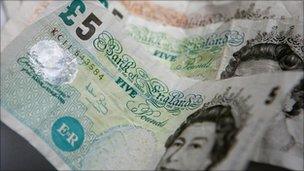Banks and small firms try to meet in the middle
- Published
Jason Stafford, of All-In-One Garden: 'A frustrating time'
Gathered in a Manchester hotel lobby are two groups of people.
On one side of the vast atrium are businessmen, all owners of small companies running everything from shops and factories to advertising agencies and internet start-ups.
On the other side are some of the UK's largest banks.
In the middle are the organisers of an event designed to bring the two sides together.
They are calling it Better Business Finance. It has been organised by the British Bankers' Association (BBA), designed to build bridges between the banking world and the small companies that rely on it.
In the wake of the financial crisis, the relationship between the two has been tense.
Banks that had their fingers burned by bad loans and large debts have been more cautious and reluctant to lend to small companies.
The companies themselves say they are being starved of the vital cash flow they need to get their business, and the economy, back up and running.
'Shop around'
Jason Stafford runs a garden centre in Knutsford and had used the same bank for more than 30 years.
When he wanted to buy a second site, he asked the bank for a loan of £1.4m.
But when the bank offered high rates and demanded more security in return, he decided to look elsewhere.
"Buying money is like buying goods and services," says Mr Stafford.
"You should shop around if you don't get what you want. After 30 years with the same bank I thought they knew my business and me.
"They wouldn't tell me why they didn't want to lend me money at good rates and that unpredictability made it difficult to plan. In the end I had to go elsewhere."
Behind target
Mr Stafford's experience is reflected in the official figures.
As part of a deal struck with the government after the financial crisis, the banks agreed to new targets on how much they would lend to business, particularly small companies.
But for the first three months of the year, they are behind target. The UK's five biggest banks lent £16.8bn to small and medium-sized (SME) companies in the first quarter of 2011.
However, under the deal with the government, the banks had agreed to lend £76bn to SMEs in 2011 - equating to £19bn a quarter.
"But it's still early days," says Stephen Pegge from Lloyds Banking Group.
"We do want to work with small businesses. When they do well, we do well.
"Our job is to build relations with them over the long term. At the start, new firms cost money. If we're able to help them from the outset, we can build a long-term relationship with them."
New environment
But that relationship is still under strain. The Federation of Small Businesses says just 16% of small companies approached banks for credit last year. Of those, 44% were turned down.

Many small companies are starting to look at alternative sources of funding
Many complain overdrafts, often needed to meet orders and pay suppliers, have dried up.
Instead, they say they are being encouraged to take on more expensive loans and credit-card debts.
So it is hardly surprising many firms have begun to look elsewhere for money.
The Business Growth Fund, launched last month, offers access to cash, but in return borrowers have to hand over a stake in their company to the fund.
So-called "crowd funding" is gaining in popularity, where it is the general public and not the banks who put up the money.
They are a type of club, where investors take a share of the profits, or even just goods and services, in return for lending the cash.
And while that is still niche, it could start to could change the way businesses raise money. In turn that is likely to affect the banks.
Phil Orford, chief executive of the Forum of Private Business, says it has been a difficult time for businesses but the market is changing.
"The days of bashing and blaming need to be put aside. We have to accept we're in a new environment in terms of lending and access to finance," he says.
Events like this one in Manchester are a chance for banks and businesses to meet in the middle.
With small companies tipped to create the jobs and growth the economy needs, getting both sides talking again could be the key to getting the economy back on track.
- Published23 May 2011
- Published19 May 2011
- Published27 May 2011